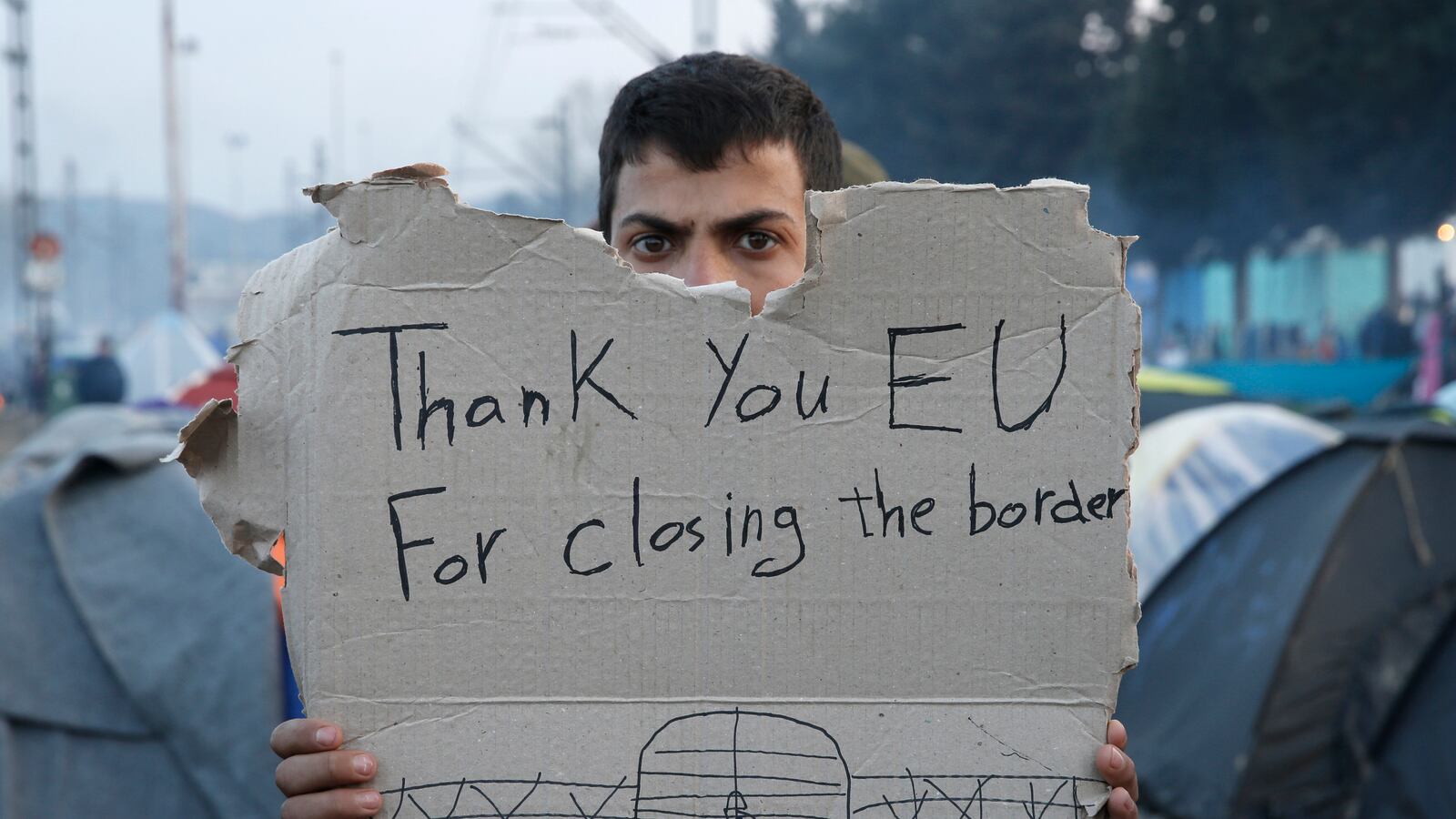BRUSSELS — Pinioned between the twin fears of militant violence and freeloading foreigners, European officials insist there’s nothing wrong with sending back refugees who risked life, limb, and their last coin to get to Greece. Those who arrived on Greece's shores this Sunday morning will be sent back.
Many of the would-be immigrants are using the refugee flow to reach “rich Europe” at last, said Estonian President Toomas Ilves, speaking at the German Marshall Fund’s Brussels Forum on Friday, the same day the European Union and Turkey sealed a contentious deal to curb illegal migration to Europe.
“The fear in European capitals is not the refugees but the effects of refugees,” Ilves said.
U.S. and European officials have said the so-called Islamic State is using the refugee surge to move hundreds of hardened fighters back into European capitals, to carry out further violence like last November’s Paris attacks, which killed 130 people.
But the economic drain on already struggling European countries was the dominant fear at the forum, as the leaders do the math on the social services they’ll have to provide—math that anti-immigrant parties across Europe are turning into election gold.
“They all adopt an anti-immigrant position. They are hostile,” Ilves said, describing anti-immigrant parties like those that just won big in German local elections. “This is a much bigger threat than simply…stopping people between Turkey and Greece.”
The Estonian president was among the European officials who painted the deal to swap thousands of Syrians, Iraqis, and Afghans stranded in Greece for “legitimate” refugees in Turkey as the best solution to head off rampant anti-immigrant sentiment that is fueling anti-foreign political parties across Europe.
“D-Day is on Monday,” said Volkan Bozkir, Turkey’s minister for European affairs, also at the forum, demonstrating the widespread confusion over the deal — which actually took effect Sunday. “Everybody who reaches the Greek islands as an illegal migrant will be registered and will be sent back to Turkey, no matter if he or she is a Syrian or Iraqi.”
The agreement calls for up to 72,000 refugees at the packed, sometimes makeshift holding areas in Greece and nearby islands to be returned to Turkey, and for Ankara to get more than $6 billion in aid and other political perks from the European Union in exchange, including faster EU membership talks.
According to the deal agreed Friday, the EU will take an equal number back after they’ve had background checks—slower than taking a dangerous boat ride to Greece but with a guaranteed path to resettlement somewhere in Europe.
That’s a potential bottleneck, according to Ozgur Unluhisarcikli, Ankara office director at the German Marshall Fund.
“There is a one-to-one formula,” he said. “But if the EU members states cannot make up the quota…that might be the end of the deal.”
The idea of this initial deal is to rob smugglers of their market just ahead of the expected uptick in attempted boat crossings as the weather warms. Why pay exorbitant fees to smugglers to go to Greece if you know you’ll simply be shipped back to Turkey? Meanwhile, the only people allowed to move on from Turkey will be those who have already been there for a year.
Turkey is already home to 2.7 million refugees, largely from Syria and Iraq, but also from Afghanistan and Africa.
It’s not a wholesale solution to the larger European immigration problem, more a thumb in the dike of one of the major leaks. More than a million refugees flooded into the region this year, many of them bound for Germany, passing through other countries with poorer economies and a weaker social safety net.
Human-rights groups have denounced the plan for returning people fleeing from war to a country that has forcibly returned some them to Syria. The European deal doesn’t even call them refugees—the term for people seeking shelter from conflict—but instead calls them “irregular migrants,” labeling them as opportunists seeking the jobs and social services available in Europe.
Other officials said the deal is an easy way out, instead of a Europe-wide plan to absorb the numbers that are likely to rise again when the weather warms.
Kerry Buck, Canada's ambassador to NATO, expressed skepticism the deal would stave off a new influx of refugees this summer, and said Europe's leaders needed to help change minds instead of their refugee laws.
“Leadership can change public opinion,” she said in an interview at the Brussels forum Sunday.
Just under half of Canadians polled didn’t want more Syrian refugees but the Canadian prime minister kept speaking on their behalf and arguing his point, she said, eventually shifted that point of view with almost 7 percent changing their mind.
“We have to get our people who spent time in the Muslim world to say what Islam is like,” to reassure people that they won’t change the country any more than the influx of Muslim Bosnians from the Balkan wars did, said Irena Krasnicka, the Czech Republic’s special envoy for migration. “So people understand it’s not anything you should fear,” she said in an interview with The Daily Beast.
The European Commission’s budget chief Kristalina Georgieva said one study in Europe showed the refugee influx would provide a much-needed infusion of youth for the aging European population, raising gross domestic product by almost a quarter, said. She said that message hadn’t gotten through to a public fearful the weight of the refugees would bring their economies down.
The deal hasn’t stopped the migrants thus far. Reuters reported Turkish authorities intercepted 1,200 refugees trying to reach the Greek island of Lesbos on Friday, and BBC reported more boats landed Sunday morning with refugees oblivious to the legal changes.






